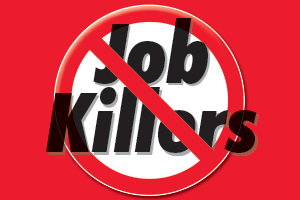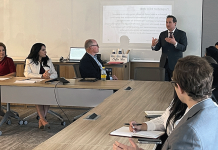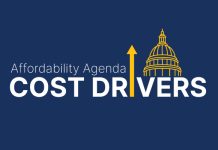The California State Assembly and Senate return today from their month-long summer recess and will consider the remaining job killer and job creator bills over the several weeks.
The next significant deadline for the job creator bills is August 28, the date by which fiscal committees must send the bills to the floor for consideration by the entire Senate or Assembly.
Job Killer Bills
 Seven Senate job killer bills and two Assembly job killer bills remain active. One job killer is on the Governor’s desk.
Seven Senate job killer bills and two Assembly job killer bills remain active. One job killer is on the Governor’s desk.
The California Chamber of Commerce has identified 19 job killer bills to date.
The following job killers are still moving:
Increased Labor Costs
SB 3 (Leno; D-San Francisco/ Leyva; D-Chino) Automatic Minimum Wage Increase — Unfairly increases employers’ costs while ignoring the economic factors or other costs of employers by increasing the minimum wage by $3.00 over the next two and a half years with automatic increases tied to inflation. Assembly Appropriations Committee; no hearing date set.
SB 406 (Jackson; D–Santa Barbara) Significant Expansion of California Family Rights Act — Increases costs, risk of litigation and less conformity with federal law by dramatically reducing the employee threshold from 50 to at least 25 employees and expanding the family members for whom leave may be taken, which will provide a California-only, separate 12-week protected leave of absence for both small and large employers to administer. Assembly Appropriations; no hearing date set.
Increased Fuel Costs
SB 350 (de León; D-Los Angeles) Costly and Burdensome Regulations — Potentially increases costs and burdens on all Californians by mandating an arbitrary and unrealistic reduction of petroleum use by 50%, increasing the current Renewable Portfolio Standard to 50% and increasing energy efficiency in buildings by 50% — all by 2030 without regard to the impact on individuals, jobs and the economy. Assembly Appropriations; no hearing date set.
Tax Increases
ACA 4 (Frazier; D-Oakley) Lowers Vote Requirement for Tax Increases — Adds complexity and uncertainty to the current tax structure and pressure to increase taxes on commercial, industrial and residential property owners by giving local governments new authority to enact special taxes, including parcel taxes, by lowering the vote threshold from two-thirds to 55%. Assembly Appropriations; no hearing date set.
SB 684 (Hancock; D-Berkeley) Increased Tax Rate — Threatens to significantly increase the corporate tax rate on publicly held corporations and financial institutions up to 15% according to the wages paid to employees in the United States, and threatens to increase that rate by 50% thereafter, if the corporation or institution reduces its workforce in the United States and simultaneously increases its contractors. Senate Governance and Finance Committee; no hearing date set.
SCA 5 (Hancock; D-Berkeley)/(Mitchell; D-Los Angeles) Split Roll — Undermines the protections of Proposition 13 by unfairly targeting commercial property owners and increasing their property taxes by assessing their property based upon current fair market value instead of acquired value. Such costs will ultimately be passed on to consumers and tenants through higher prices and will result in job loss as businesses struggle to absorb such a dramatic tax increase. (Amended 06/09/15). Senate Governance and Finance Committee; no hearing date set.
Increased Burdensome Environmental Regulation
SB 32 (Pavley; D-Agoura Hills) Slows Economic Growth — Increases costs for California businesses, makes them less competitive and discourages economic growth by adopting further greenhouse gas emission reductions for 2030 and 2050 without regard to the impact on individuals, jobs and the economy. Assembly Appropriations; no hearing date set.
SB 654 (de León; D-Los Angeles) Creates Unworkable Hazardous Waste Permitting Process — Discourages investment in upgrading and improving hazardous waste facilities by shutting down hazardous waste facilities if the Department of Toxic Substances Control fails to take final action on the permit renewal application within a specified timeframe, even if the permit applicant acted diligently and in good faith throughout the permit application process. Assembly Appropriations; no hearing date set.
Increased Unnecessary Litigation Costs
AB 465 (R. Hernández; D-West Covina) Increased Litigation — Significantly drives up litigation costs for all California employers as well as increases pressure on the already-overburdened judicial system by precluding mandatory employment arbitration agreements, which is likely pre-empted by the Federal Arbitration Act. Senate Floor.
Job Killer To Governor
A bill that denies employers the basic choice of whom to hire is on the Governor’s desk.
AB 359 (Gonzalez; D-San Diego) inappropriately alters the employment relationship by requiring any successor grocery employer to retain employees of the former grocery employer for 90 days and continue to offer continued employment unless the employees’ performance during the 90-day period was unsatisfactory.
For more information on the remaining job killer bills, visit www.CAJobKillers.com
Job Creator Bills
 Four job creator bills are still alive following the July 17 deadline for bills to pass policy committees and move to the floor.
Four job creator bills are still alive following the July 17 deadline for bills to pass policy committees and move to the floor.
The CalChamber has identified 13 job creator bills to date.
The following job creator bills are still moving:
Creates Construction Jobs
AB 35 (Chiu; D-San Francisco) Creates Affordable Housing Opportunities. Promotes affordable housing by expanding the existing low-income housing tax credit program, making the state better able to leverage an estimated $200 million more in Federal Tax Credits. Senate Appropriations Committee hearing August 17.
Improved Legal Climate
AB 1506 (R. Hernández; D-West Covina) Labor Code Private Attorneys General Act of 2004. Seeks to limit frivolous and costly litigation against employers for technical violations on an itemized wage statement that does not create any injury to an employee, by allowing the employer a limited time period to fix the violation before any civil litigation is pursued, so that an employer can devote its financial resources to expanding its workforce. Senate Appropriations hearing August 17.
SB 251 (Roth; D-Riverside) Incentivizing Disability Access and Education. Seeks to limit frivolous litigation and claims regarding construction-related accessibility claims by providing businesses who have proactively sought to become Americans with Disabilities Act (ADA) compliant with an opportunity to resolve any identified violations as well as to provide a limited period in which to resolve technical violations that do not actually impede access. Assembly Appropriations Committee; no hearing date set.
Tourism
SB 249 (Hueso; D-San Diego) Enhanced Driver’s License. Encourages international trade and tourism by authorizing the Department of Motor Vehicles to issue enhanced driver licenses to U.S. citizens to expedite legal traffic at the border. Assembly Appropriations Committee; no hearing date set.
Job Creator Bill Signed by Governor
A fifth job creator has already been signed into law: AB 323 (Olsen; R-Modesto) Expedites and Reduces Cost for Roadway Repair and Maintenance Projects. Streamlines infrastructure development by extending until January 1, 2020 the current California Environmental Quality Act (CEQA) exemption for certain roadway repair and maintenance projects. Signed—Chapter 52, Statutes of 2015.
For more information on the remaining job creator bills, visit www.CalChamber.com/JobCreators




